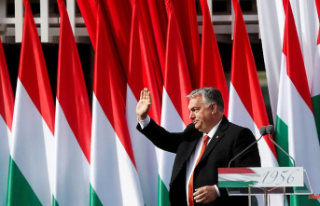Incumbent Olaf Scholz improves his score slightly when it comes to the chancellor question, but the trend barometer has bad news for him on another issue: 51 percent of Germans consider the chancellor to be less decisive than his predecessor.
The political mood remains stable. Only the left gains one percentage point, while the AfD loses one percentage point.
If the Bundestag were elected now, the parties could expect the following result: CDU/CSU 28 percent (Bundestag election in September 2021: 24.1 percent), Greens 20 percent (14.8 percent), SPD 19 percent (25.7 percent) , AfD 13 percent (10.3 percent), FDP 6 percent (11.5 percent), Left 5 percent (4.9 percent). 9 percent of voters (8.7 percent) would choose other parties. At 25 percent, the proportion of non-voters and undecided is slightly higher than in the last federal election (23.4 percent).
The chancellor's preferences have also changed little compared to the previous week; Only Chancellor Olaf Scholz improves his value slightly by one percentage point - both in a theoretical constellation with CDU leader Friedrich Merz and the Green Federal Minister of Economics Robert Habeck as other candidates and against Merz and Foreign Minister Annalena Baerbock.
If those entitled to vote could elect the Chancellor directly and they had the choice between Scholz, Habeck and Merz, 22 percent would currently choose Scholz, one percentage point more than in the previous week. Merz and Habeck each accounted for an unchanged 20 percent.
If those entitled to vote had the choice between Scholz, Merz and Baerbock, 25 percent would choose Scholz and, as in the previous week, 22 percent would choose Merz and Baerbock.
With regard to Chancellor Scholz's previous duties in the Ukraine and energy crisis, only 11 percent of Germans have the impression that Scholz is acting more decisively and decisively than his predecessor Angela Merkel. 51 percent believe that Scholz acts less decisively and decisively than Merkel. 35 percent see no big difference between Scholz' and Merkel's administration.
Even among the supporters of the SPD, only a minority (31 percent) thinks that the Federal Chancellor is acting more decisively and decisively than Merkel. Among them, 36 percent say Scholz is less determined, 32 percent see no big difference.
When asked whether Economics Minister Habeck explained the energy crisis and his policies in an understandable way, 17 percent answered "always", 41 percent said "usually". 22 percent understand Habeck's explanations "usually not", 11 percent "never".
Respondents with lower (48 percent) and middle educational qualifications (46 percent) state much more frequently than those with a higher level of formal education (25 percent) that they usually do not or never understand Habeck's explanations on the current energy crisis.
12 percent each of all eligible voters currently trust the Union, the SPD and the Greens to deal with the problems in Germany. Compared to the previous week, the SPD and Union are up one point each, the Greens lose two points.
3 percent trust the FDP, 5 percent one of the other parties. 56 percent currently do not trust any party to deal with the problems in Germany.
The economic expectations are no longer quite as pessimistic as in the previous weeks. 15 percent of Germans expect that the economic situation in Germany will improve in the coming years. 65 percent expect the economic situation to deteriorate, 18 percent no change.
The gap between those who expect the economic situation to deteriorate and those who expect an improvement is 50 percentage points, the narrowest it has been since March.
Among the price increases, those for food burden the Germans the most. 71 percent name this area, followed by heating (61 percent), electricity (59 percent) and petrol and diesel (51 percent). There are no fundamental differences between the individual income groups on this question.
Around a third of Germans (34 percent) believe that many or very many industrial companies will relocate their production abroad due to the high energy prices in Germany. Just under half (48 percent) expect some industrial companies to do so. Only 12 percent do not assume that industrial companies will leave Germany as a result of the high energy prices.
An above-average number of East Germans and supporters of the FDP and especially the AfD believe that many industrial companies will relocate their production abroad because of the high energy prices.
In the metal and electrical industry, employers and unions have agreed on a one-off payment of 3,000 euros and wage increases of 5.2 percent from June 2023 and 3.2 percent from May 2024. 45 percent of Germans consider such wage increases to be manageable for companies in other sectors as well. 14 percent believe that wages could be increased even more.
31 percent consider wage increases of this kind to be too expensive for companies in other sectors. East Germans and supporters of the FDP and AfD think the latter is more common than average
With 57 percent, the war in the Ukraine is still the most important issue for German citizens. The problems of energy supply and the high costs of energy remain important issues - however, the proportion of Germans who consider the energy crisis to be the most important issue continues to fall. Despite the criticism of the venue, there was greater interest in football than in the Corona crisis or the discussion about citizen income.
The most important topics:
The data was collected by the market and opinion research institute Forsa on behalf of RTL Germany from November 15 to 21, 2022. Database: 2502 respondents. Statistical error tolerance: /- 2.5 percentage points. Data on job satisfaction from Scholz and Habeck and opinions on inflation were collected on November 18 and 21. Database: 1002 respondents. Statistical error tolerance: /- 3 percentage points.
More information about Forsa here.Forsa surveys commissioned by RTL Germany.












